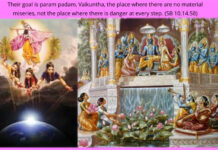Life is not always straightforward as we wish it to be. To some, life is a well planned journey with a defined goal and to some it is like a football with no specific direction. To some it is as involving as writing a beautiful poetry while to others it is just as boring as typing out a company’s terms and conditions. To some it is enjoyable as enacting a drama and to others it is as difficult as resolving a tough mathematical equation. Whatever it may be, every life is full of actions. Actions that we planned and actions that were unplanned. When we plan a long-term action, oftentimes we get a question- where to start?

There are times in our life when we want to do a lot or say a lot but do not know where to start from. In a cycle of events, the first thing is always a thought. When we dwell on a particular thought it grows into a desire which, if pursued further, takes the shape of an action in due course of time. This is thinking, feeling, willing and finally doing.
However, every action requires a beginning and, at times, beginning is the most difficult part of an action. There are plenty of instances starting from a child wanting to climb a ladder to a teenager struggling to choose his career, one’s embarking on a business venture or entering a relationship and getting married, and so on. At times, opening a public address and even starting to write an article also gets difficult. It is not only about where to start but also how to start.
A few conventional solutions include taking advice from senior well-wishers, sharing thoughts with trusted friends, talking to those who have experience dealing with such scenarios, and so on. But what to do when none of them seem to work?
While all of us are not the same, there are similarities of life events in this world. People are found to have similar thinking patterns. Although common sense may not be always common certain tricks do work almost always and for almost everyone.
First we need to understand what prevents us from taking the first step. The reason behind hesitation is nothing else but the unknown future that remains a mystery to us. We are not always sure if we take the first step, what will be our fifth or tenth step. We are unaware of what we will need to do if we get stuck at the eleventh step. We are unaware whether stepping back will help or hurt.
Is this due to lack of self confidence? No. Is it pessimism? No. Is the very question, where to start, some sort of mental weakness? No.
Some think that optimism is the way and prefer to deal with problems as they surface. Others wisely look at the risk factors before jumping into an unknown domain of uncertainties. It is better to be safe than sorry. When starting gets difficult, hold back and think why it is so. Is it just your fear, lack of experience, undue hesitation, or is it a warning from a superior, well-wishing being who is aware of your future?
Begin with acknowledging that no matter how much we wish and how much we profess, we are not the controller. This remains true for a child as well as for the president of a country. If human beings were the sole controller, the world would have ceased to exist long ago. Human beings are simply allowed to control certain things for a certain period of time. In other words, their ability to control is borrowed.
Those who control human beings, the devas, or the demigods, are also not independent controllers as they follow the rules made by the supreme controller, who is referred to as Parameshvara in the Bhagavad Gita and other Vedic scriptures. Let it be clear that the reason the Vedic scriptures sometimes refer to all living entities as ishvara is because we, being the part and parcel of Parameshvara, have received some ability to control, albeit in a minute quantity, just like a drop of ocean water has the quality of the ocean.
Once this is understood the answer to our question becomes simple. Three beautiful verses spoken personally by Lord Krishna in the Bhagavad Gita summarize the answer in a simplest way. You may have read them number of times or may have even memorized them. If that is the case, the only thing you now need to do is put your learning in practice and you are almost there. These verses do not only tell us where to start but also tell us how to start, where to end and how to end. It’s a complete solution to all our problems in terms of work.
raso ’ham apsu kaunteya prabhasmi ssashi-suryayoḥ
praṇavaḥ sarva-vedeshu shabdaḥ khe paurusham nrshu
Translation: O son of Kunti, I am the taste of water, the light of the sun and the moon, the syllable om in the Vedic mantras; I am the sound in ether and ability in man. (B.G. 7.8)
prakrteḥ kriyamanani gunaih karmani sarvashah
ahankara-vimudhatma kartaham iti manyate
Translation: The spirit soul bewildered by the influence of false ego thinks himself the doer of activities that are in actuality carried out by the three modes of material nature. (B.G. 3.27)
Note how the above two verses explain how things work in this world regardless of who carries them out. Even the demigods like Moon and the Sun do not have their own powers what to speak of ability in man. This verses make it clear that no one can do anything without the help of the Supreme Lord. It is also explained that only those who are bewildered think of themselves to be the doers when it is the modes of nature that work behind the scene.
This, however, does not absolve us from the responsibility of our karma because it is we who desire a particular action. The modes of nature simply execute the work on the sanction of the Supreme Lord. Again, this does not mean the modes of nature and Paramatma are bound to work as per our desires. Paramatma hears our desires and out of His love for us and out of His sweet will, orders the material nature to fulfill them. It is said that not even a blade of grass moves without the sanction of God. This is a reality of life that all cannot easily digest but nonetheless are forced to follow.
Behind every action is our desires which we cultivate by associating with the modes of material nature. By contemplating on our desires we gradually mold our life. Life does not necessarily mean one lifetime. Life is a continuous journey from one body to another. Just like a movie is a combination of thousands of image frames, what we call life is a combination of changing bodies. Living in one body we define our goals and chase them while meeting failures and successes. Whatever remains undone during the duration of one body, or one lifetime, gets carried forward into the next life. This is an inescapable karmic cycle which all conditioned souls are going through without any exception.
The third verse, perhaps the most famous one, concludes the answer.
karmany evadhikaras te ma phaleshu kadachana
ma karma-phala-hetur bhur ma te sango ’stv akarmani
Translation: You have a right to perform your prescribed duty, but you are not entitled to the fruits of action. Never consider yourself the cause of the results of your activities, and never be attached to not doing your duty. (B.G. 2.47)
What to do when we do not know where to start? Remember the above three verses and mediate on your role. Is it you who can decide on your own where to start, or is it the ability in you, given by the Supreme Lord, that helps you decide where to start? Even if it is only the ability in you that helps you decide where to start and how to go about the process, how can you make the material nature initiate the work without the sanction of the Supreme Lord? And even after it gets sanctioned by the Lord, it is you who is going to enjoy or suffer the reaction. This fact could again cause hesitation and you might get back to square one asking the same question- what to do and where to start.
The verse above is the key to get rid of all fears and confusion. As mentioned earlier, the reason we get stuck at the first step is our ignorance of the future. This is natural as the question “where to start?” is connected to the question “what to do the next?”. But if we can offer the result of our actions to God we have nothing to worry. One important factor, however, is that giving away the fruit of hard work to someone else is only possible if we love that person. Working for a beloved also helps us carry out the actions with utmost sincerity as we want to offer the best.
In conclusion, if we can understand our position as the eternally dependent children of the Lord, if we understand how His energies function, and if we can love Him, all our confusion is over as we will start our work and end our work for His pleasure. The anxiety as to where to start is only manifested because we falsely think of ourselves to be the doers and enjoyers. By giving up this tendency we can quickly rise to the spiritual platform thus achieving higher goals without getting entangled in the karmic cycle.



























